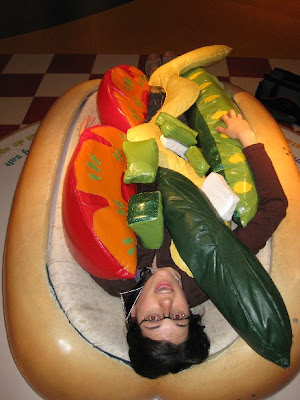First up, the four-day trip I took to Chicago and its hinterland last week, with my academic home away from home, CHE (the Nelson Institute for Environmental Studies's Center for Culture, History, and Environment). Although my official department is the History of Science, I spend way more time with CHE--my office is located there, I've served as a Project Assistant and Graduate Representative for the program, and most of my friends and intellectual colleagues are there. So, every year for the past three year's CHE takes a trip, or "place-based workshop" to somewhere not far from Madison and spends a few days really trying to get to know the place from the perspective of environmental history. We try to "read the landscape," or, in other words, to understand the histories of the places we live, work, and play through the interpreation of clues laid down by history, culture, and natural forces. The first year, the workshop was in the Apostle Islands of Lake Superior, last year it was in the agricultural landscapes of Southwest Wisconsin's Kickapoo River Valley and driftless area (I helped to plan that one), and this year, the trip visited Chicago and the Indiana Dunes National Lakeshore.
The trip was four days: (Day 1) learning about the history of ecology and of modern environmentalism at the Indiana Dunes National Lakeshore--much of the work my advisor writes about in The State of Nature; (Day 2) a day of learning about environmental justice in the Southside neighborhoods of Little Village and Englewood, and about Packingtown; (Day 3) learning about downtown Chicago's urban infrastructure through a downtown walking tour, about the relationship of Chicago with its Western hinterland (the topic of another of my advisor's most foundational books, Nature's Metropolis), and about the Chicago History Museum; and (Day 4) learning about issues of class in the North Shore suburbs.
The whole thing was such an enormous treat. The intellectual conversation and stimulation was incredibly lively--especially because we had access to the foremost experts in environmental history and urban history leading us through the city. The social interactions were just the thing I needed after a semester of being deprived of people and friendship--so many good bus conversations, so many interesting new people. And the sense of being part of a larger community was just unparalleled--it made me feel at home in this academic niche.
I also got to write our names in the sand:
 Watch kids in Little Village play that awesome parachute game from elementary school (remember that?):
Watch kids in Little Village play that awesome parachute game from elementary school (remember that?): Learn about how really tall skyscrapers can stably stand on the marshy ground of Chicago:
Learn about how really tall skyscrapers can stably stand on the marshy ground of Chicago: Turn myself into a Chicago-style hot dog:
Turn myself into a Chicago-style hot dog: And pull a tick out of my head:
And pull a tick out of my head: Hooray for place-based workshops, and feeling alive again!
Hooray for place-based workshops, and feeling alive again!
No comments:
Post a Comment